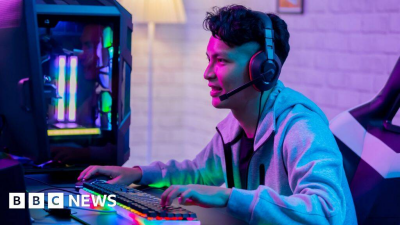BBC News Top Stories-Technology China appears to U-turn on strict gaming rules proposals
January 23, 2024 2 min 335 words
这则报道揭示了中国政府在游戏监管上的一次明显变向,尤其是在涉及到抑制玩家支出和时间的提案。原计划的规定被撤回,引发了中国游戏公司股价的上涨。然而,行业仍然笼罩在政策不确定性中,分析师指出,这种情绪可能会持续一段时间。政府在2021年曾实施过限制儿童游戏时间的措施,导致股价下跌。这次的变动似乎是对过去政策的调整,对于游戏行业来说是一种利好。然而,对于未来政府可能采取的行动仍存在不确定性。在这种情况下,游戏公司可能会寻求更多海外市场,为行业的发展开辟新空间。政策变动背后的动机和未来发展仍是值得关注的焦点。
China seems to have backtracked on strict rules to combat what the regulator deemed "obsessive" gaming.
The National Press and Publication Administration (NPPA) had proposed regulations limiting the amount of money and time people spent playing video games.
However, on Tuesday the draft rules were no longer on the NPPA website.
China is the world's biggest online gaming market, but the industry has had frequent run-ins with the authorities.
The new rules would have limited in-game purchases. Incentives such as daily log-in rewards for gamers would also have come under fire, while the introduction of a pop-up warning players of "irrational" behaviour was proposed.
Share prices of Chinese gaming firms - including the world's biggest gaming company Tencent Holdings and its rival NetEase - jumped after the apparent U-turn.
They had plummeted after the rules were first proposed in December, wiping nearly $80bn (£63bn) off the value of the two companies.
However, analysts say the sector is still clouded by uncertainty about what the government might do next.
"I think this type of sentiment will probably last for quite some time, unless we get a very drastic turnaround in government rhetoric, or unless we get some super supportive policies," said Ivan Su, senior analyst at Morningstar.
"We don't know if it's going to happen in a week, in a couple months, or in a couple of years."
China's largest crackdown on gamers came in 2021 when children were banned from playing for more than an hour on certain days.
That same year, the government stopped gaming licences from being granted for eight months.
As a result, says Mr Su, "a lot of Chinese developers have started shifting their development pipeline toward overseas games".
NetEase and Tencent acquired or invested in companies in the likes of France, Japan and the United States.
It remains to be seen whether the current uncertainty will prompt another wave of overseas expansion.

